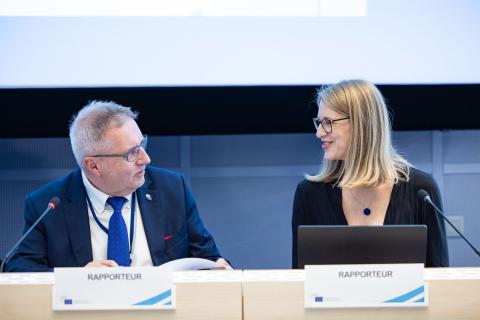European Economic
and Social Committee
Towards a Union Free from Poverty: EESC Calls for a Comprehensive EU Anti-Poverty Strategy
At its July 2025 plenary session, the European Economic and Social Committee (EESC) adopted a pivotal opinion calling for the creation of a robust, rights-based EU Anti-Poverty Strategy (APS). This strategy, requested by the European Commission, aims to eradicate extreme poverty across the Union by recognising it not as an unfortunate by-product of economic systems, but as a systemic injustice and a violation of fundamental rights.
The EESC’s opinion on an "EU Anti-poverty Strategy" proposes a multidimensional approach to poverty, one that goes beyond material deprivation to include social, psychological, political, and gender-based dimensions. It calls for a shift in narrative: poverty must be seen as a preventable injustice rooted in inequality, not an inevitable outcome of economic development. The strategy should set ambitious and measurable targets, such as halving poverty by 2030, and improve the tools used to measure poverty, including the AROPE indicator and EU-SILC data.
A Foundation of Adequate Income and Social Protection
"21% of people living in the richest part of the world are experiencing poverty: this is extremely unjust and a serious blow to human dignity. The aim of the EU Anti-Poverty Strategy should therefore be the eradication of poverty – here and now! " declared rapporteur Krzysztof Balon during the debate surrounding the opinion's adoption.
“National governments finally need to take responsibility and step up measures to tackle poverty. Work should provide a solid foundation, which is why we call for active labour market policies, quality jobs and living wages. At the same time, access to services of general interest – such as water, electricity, housing and healthcare – should be guaranteed,” co-rapporteur Sophia Reisecker further explained.
Central to the proposed strategy is the guarantee of adequate income and comprehensive social protection across all Member States. The EESC strongly supports the full implementation of the Council Recommendation on Adequate Minimum Income and urges national governments to develop or strengthen their own anti-poverty strategies. These should address the widespread issue of non-take-up of benefits, which is often caused by administrative complexity, digital barriers, stigma, or lack of awareness.
The Committee also highlights the importance of ensuring pension adequacy and strengthening social safety nets, particularly for older people and persons with disabilities, who remain disproportionately affected by poverty and social exclusion.
Tackling In-Work Poverty Through Quality Employment
The EESC stresses that employment is no longer a guaranteed path out of poverty. In-work poverty is a growing concern, and addressing it requires a holistic approach. The Committee calls for the promotion of quality jobs—those that offer fair wages, secure contracts, strong workers’ rights, and access to social protection. It welcomes the ILO’s endorsement of living wages and urges swift implementation of the EU Directive on Adequate Minimum Wages.
Lifelong learning and upskilling are also essential, particularly in the context of the green and digital transitions. The EESC advocates for investment in inclusive labour market policies that support vulnerable workers and promote equal pay and opportunities for all.
Universal Access to Essential Services
Access to affordable, high-quality services is a cornerstone of poverty prevention. The EESC calls for increased public investment in healthcare, housing, education, childcare, and long-term care. It supports the enforcement of the European Child Guarantee and the development of an EU homelessness strategy, including ambitious targets for affordable housing.
The opinion also addresses the growing issue of energy poverty and calls for national plans to ensure equal access to energy at affordable prices. As services become increasingly digital, the EESC insists that physical alternatives and user-friendly assistance must remain available to prevent digital exclusion.
Addressing Intersectional Vulnerabilities
Poverty often intersects with other forms of disadvantage, such as gender, disability, migration status, or age. The EESC calls for improved data collection on intersectional poverty and urges the EU to explore ways to prevent socio-economic status from becoming a basis for discrimination. It also highlights the need to protect migrants, asylum seekers, and undocumented individuals, and to ensure their access to essential services and legal aid.
The Committee warns against the criminalisation of poverty, including homelessness and acts of solidarity, and calls for measures to ensure equal access to justice for all.
Governance, Funding and Participation
Effective implementation of the Anti-Poverty Strategy will require strong governance, adequate funding, and meaningful participation. The EESC proposes the appointment of a dedicated EU Anti-Poverty Coordinator to ensure policy coherence and coordination across institutions. It also recommends integrating poverty reduction into the European Semester and aligning EU funding with progressive tax systems that promote fairness and social investment.
The Committee emphasises the importance of involving people experiencing poverty in the design, implementation, and evaluation of policies that affect them. It also calls for sustainable funding and protection for civil society organisations and social partners, which play a vital role in advocating for and supporting vulnerable communities.
A Call to Action
With over 93 million people in the EU at risk of poverty or social exclusion—including nearly 20 million children, the EESC’s message is clear: the time for voluntary, fragmented measures is over. Europe needs a bold, coordinated strategy that addresses the root causes of poverty. The proposed EU Anti-Poverty Strategy offers a comprehensive roadmap to build a fairer, more inclusive Union.
